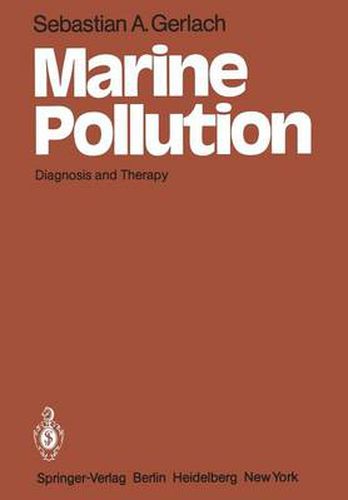Readings Newsletter
Become a Readings Member to make your shopping experience even easier.
Sign in or sign up for free!
You’re not far away from qualifying for FREE standard shipping within Australia
You’ve qualified for FREE standard shipping within Australia
The cart is loading…






This title is printed to order. This book may have been self-published. If so, we cannot guarantee the quality of the content. In the main most books will have gone through the editing process however some may not. We therefore suggest that you be aware of this before ordering this book. If in doubt check either the author or publisher’s details as we are unable to accept any returns unless they are faulty. Please contact us if you have any questions.
When, in 1966, the Gennan Research Society directed the attention of oceanographers in the Federal Republic of Ger many to problems of marine pollution, I was not enthusiastic. Emphasis on this problem area meant that other important research plans had to be postponed. But the lectures at the Third International Oceanographic Congress, September 1970, in Tokyo, and at the FAO Conference on Marine Pollution and its Effects on Living Resources and Fishing, December 1970, in Rome, convinced me that research on problems of marine pollution is a social obligation, and that the oceanographer has to take a stand. I issued public warnings about the continuing use of pesticides and had to defend myself against protests by the fishing industry and many colleagues who were, in Novem ber 1970, unaware of the extent of the threat. Thus, I was required by my profession to acquire an overview of the prob lems of ocean pollution. In 1971 I only needed to familiarize myself with some one hundred bibliographical items. In the interim, the flood of data has risen dramatically, and in the year 1975, no fewer than 868 publications under the heading of Marine Pollution were reported (Table 1). It is, therefore, more and more diffi cult to distinguish new results of scientific research from the many repetitions and variations, and I fear that from year to year my efforts to illustrate the actual status of the problem at a given moment will be subject to more gaps.
$9.00 standard shipping within Australia
FREE standard shipping within Australia for orders over $100.00
Express & International shipping calculated at checkout
This title is printed to order. This book may have been self-published. If so, we cannot guarantee the quality of the content. In the main most books will have gone through the editing process however some may not. We therefore suggest that you be aware of this before ordering this book. If in doubt check either the author or publisher’s details as we are unable to accept any returns unless they are faulty. Please contact us if you have any questions.
When, in 1966, the Gennan Research Society directed the attention of oceanographers in the Federal Republic of Ger many to problems of marine pollution, I was not enthusiastic. Emphasis on this problem area meant that other important research plans had to be postponed. But the lectures at the Third International Oceanographic Congress, September 1970, in Tokyo, and at the FAO Conference on Marine Pollution and its Effects on Living Resources and Fishing, December 1970, in Rome, convinced me that research on problems of marine pollution is a social obligation, and that the oceanographer has to take a stand. I issued public warnings about the continuing use of pesticides and had to defend myself against protests by the fishing industry and many colleagues who were, in Novem ber 1970, unaware of the extent of the threat. Thus, I was required by my profession to acquire an overview of the prob lems of ocean pollution. In 1971 I only needed to familiarize myself with some one hundred bibliographical items. In the interim, the flood of data has risen dramatically, and in the year 1975, no fewer than 868 publications under the heading of Marine Pollution were reported (Table 1). It is, therefore, more and more diffi cult to distinguish new results of scientific research from the many repetitions and variations, and I fear that from year to year my efforts to illustrate the actual status of the problem at a given moment will be subject to more gaps.